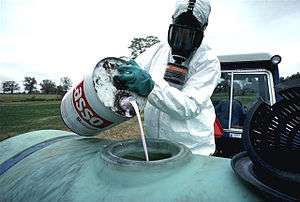Restricted use pesticide
Restricted use pesticides or "RUP" are pesticides not available to the general public in the United States. The "Restricted Use" classification restricts a product, or its uses, to use by a certificated pesticide applicator or under the direct supervision of a certified applicator. This means that a license is required to purchase and apply the product. Certification programs are administered by the federal government, individual states, and by company policies that vary from state to state. This is managed by the United States Environmental Protection Agency (EPA) under the Worker Protection Standard.
Pesticides are classified as "restricted use" for a variety of reasons, such as potential for or history of groundwater contamination. Atrazine is the most widely used restricted-use herbicide. Many insecticides and fungicides used in fruit production are restricted use.
List
The list of restricted use pesticides is maintained by the US EPA.
This list may change from time to time. It may be necessary to download and store copies to observe change history.
Requirement
The Worker Protection Standard (WPS) identifies the type of requirements that must be satisfied to obtain the proper license needed to purchase and apply restricted use pesticide.
The Hazard Communication Standard requires all employers to disclose all hazards to employees separately from the WPS.
Licensed pest control supervisors must maintain application records for 3 years or more, as determined by state and federal laws. These records must identify the date, location, and type of pesticide that has been applied.
Additionally, the licensed pest control supervisors must notify the local government agency that is responsible for air quality to satisfy laws governing the Right to know regarding public health and safety risks when restricted use pesticides are applied outside buildings.
See also
- Federal Insecticide, Fungicide, and Rodenticide Act (FIFRA)
- pesticide misuse
- Toxicity Class
- Worker Protection Standard
References
- ↑ "Restricted Use Products (RUP) Report". United States Environmental Protection Agency.
- ↑ "Worker Safety and Training". United States Environmental Protection Agency.
- ↑ "Learn about Your Right to Know". United States Environmental Protection Agency.
